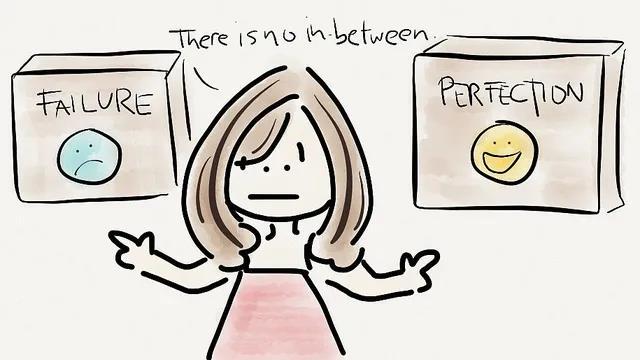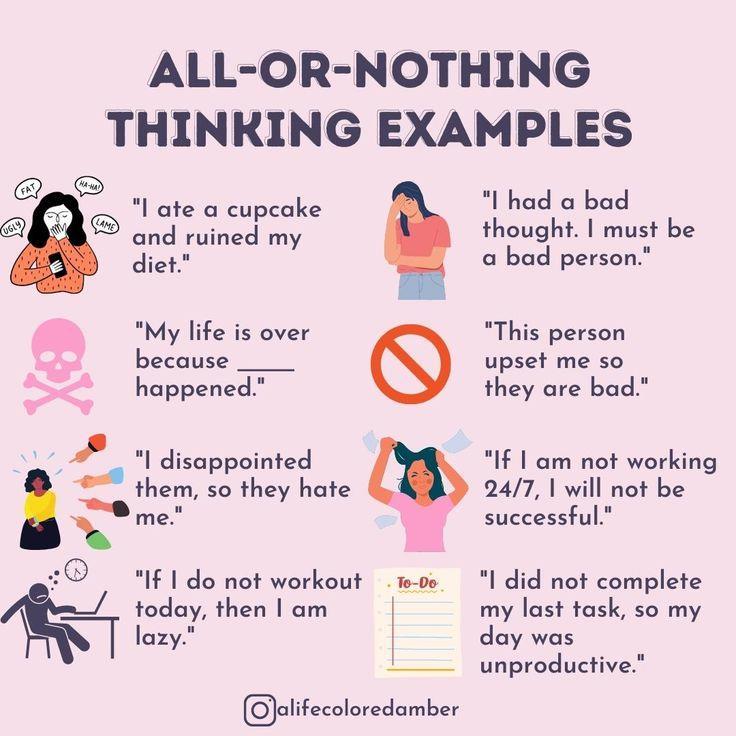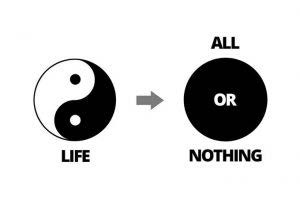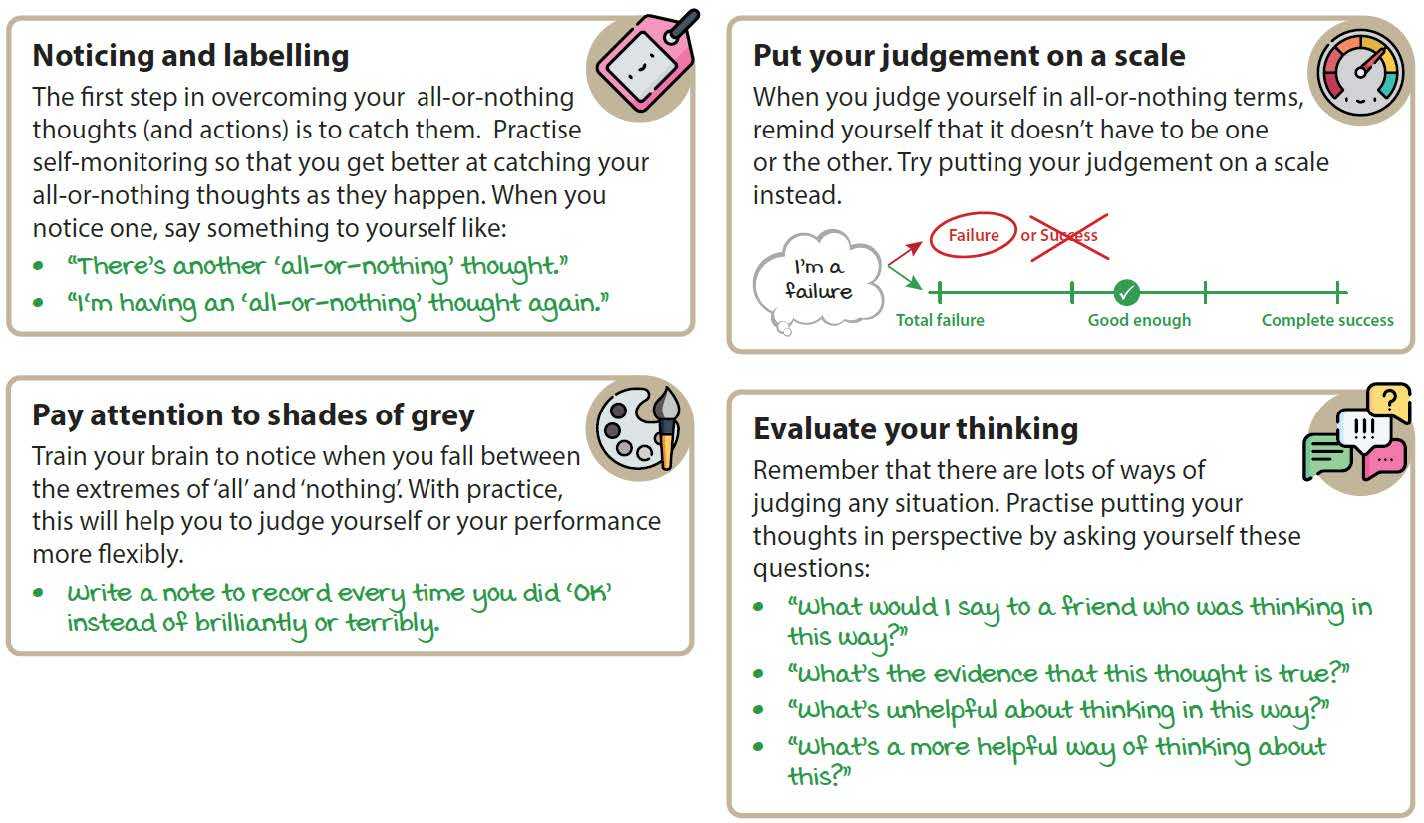Unhelpful Thinking Styles: All-Or-Nothing Thinking

(Picture source: https://reachoutwithniamhdotcom.wordpress.com/2017/11/09/reviewing-all-or-nothing-thinking/)
In our last newsletter, my colleague Mandy kicked off our Unhelpful Thinking Styles series by telling us more about Catastrophizing. In this newsletter I would like to talk about All-or-Nothing Thinking (sometimes called Black and White-, Polarized-, or Dichotomous Thinking). But before I get started, I think it’s important to mention that we all sometimes engage in unhelpful thinking (also referred to as thinking traps or cognitive distortions.) When we experience an overwhelming emotion (e.g., depression or anxiety), it is usually preceded by several unhelpful thoughts and self-statements. Unfortunately, our brains are not great scientists and instead of analyzing all the available evidence and making an informed decision about situations in our everyday life, it often makes instant gut reactions based on faulty logic, or ‘short cuts’, resulting in us thinking things that are not completely accurate. Unhelpful thinking is often the result of an attempt to simplify, understand, or reduce the impacts of a distressing situation. Due to the remodelling of the brain’s prefrontal cortex during the teenage years, teenagers may rely more on emotions, impulses and instinctive behaviour, rather than problem solving logic.
All-or-Nothing thinking is a pattern of thought that views situations as an either-or, all good or all bad, or all right and all wrong with no in-between, middle ground, or grey area. All-or-nothing thinking is especially common in perfectionism, depression, eating disorders, borderline personality disorder and burnout. It can also be common amongst neurodivergent people who are on the Autistic spectrum or have an ADHD diagnosis. However, all of us can sometimes engage in this thinking trap!
Thinking in extremes can be detrimental to one’s health and wellbeing in many ways. It can prevent a person from taking risks in life, exploring new opportunities, overcoming their fears, learning, achieving their goals, and having good relationships with other people. Pursuing excellence is good, but perfectionism (looking at mistakes as a sign of personal defectiveness) decreases one’s personal happiness. It can lead to chronic procrastination, difficulty completing tasks, or giving up easily. Furthermore, it hinders one’s growth and success, and may contribute to low self-esteem, anxiety, and depression as it tends to create a vicious cycle of setting impossibly high standards, getting overwhelmed, and feeling like a failure all the time.
Examples of All-or-Nothing thinking
Here are some everyday examples of All-or-Nothing thinking:

Supporting your Child in Challenging All-or-Nothing Thinking
- Focus on your child’s strengths. Instead of focusing on what went wrong, pay attention to their effort. This will allow them to be kinder to themselves. For example, if they made a mistake during a performance, remind them of the other things that went well and the fact that they did their best
- Reward your child for progress and effort, not the outcome or results. Having a growth mindset will support children in the realization of their goals. It will also allow them to experience peace with themselves, health, happiness and positive relationships. For example, if they are unhappy with an art project they have worked on, you can ask them whether they had to learn any new art skills to make this project. Look at mistakes as opportunities for growth, rather than as signs of failure. We learn from errors, not successes. Each apparent step backward merely brings us closer to our goals.
- Define the grey areas for them. For example, ask them what is one thing that they DO like about the project. Making use of visuals might help children to embrace and celebrate the grey areas in life, e.g.


Picture source: https://sova.pitt.edu/cognitive-distortions-all-or-nothing-thinking/
- Remind children that a bad moment does not equal a bad day. At the end of the day, come up with a list of good things that happened. This will have the added benefit of practicing gratitude, which is proven to have numerous emotional, social, personality, career and health benefits.
- Regularly practice helpful self-statements with your child. It is a good idea to practice these helpful statements habitually, because enough repetition will turn positive realistic thoughts into a habit and help crowd out the negative self-talk. Some examples of positive realistic statements:
- Nobody is perfect!
- All I can do is my best!
- Making a mistake does not mean I’m stupid or a failure. It only means that I am like everyone else – human. Everyone makes mistakes!
- It’s okay not to be pleasant all the time. Everyone has a bad day sometimes.
- It’s okay if some people don’t like me. No one is liked by everyone!
- If you took the ‘all or nothing’ glasses off, what would you see?
- Are there any ‘shades of grey’ you might be missing with this thought?
- What is a more generous/kind/realistic way of looking at this situation?
Here is a list of other questions that may help you to support your child when you detect this unhelpful thinking style:
- If you took the ‘all or nothing’ glasses off, what would you see?
- Are there any ‘shades of grey’ you might be missing with this thought?
- What is a more generous/kind/realistic way of looking at this situation?
- You have said that you were a total failure. Was there anything that was ‘OK’ about your performance? What does it say about you that you tried?
- Would you apply this unrealistic standard to everyone? Why/why not?
- How would you be able to start learning something if you’re a perfectionist, since learning implies imperfection?
- Describe five people you know well and think highly of. Are they perfect in everything? Ask them.
- Do you accept imperfection in your friends?
- Ask your best friends whether they believe that you have to be perfect to be worthwhile or acceptable.
I’ll conclude with some other suggestions provided by Psychology Tools to overcome All-or-Nothing thinking:

(Copyright © 2023 Psychology Tools Limited. All rights reserved)
Until next time,
Marisa Smit
CGS Psychologist

 1046
1046











